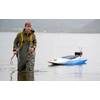Building community resilience through ecosystem-based adaptation (EbA) is a new application of BMT’s climate change capabilities. In the Pacific, climate change resilience and adaptation is increasingly being considered in the context of EbA, which concentrates on ecosystem services in adapting to the adverse effects of climate change. This contrasts with the infrastructure or property emphasis of traditional climate change adaptation assessments, and is particularly pertinent to Pacific Islands where communities rely heavily on their local natural resources. By taking into account the ecosystem services on which people depend for their livelihoods as well as social and economic security, EbA integrates sustainable use of biodiversity and ecosystem services in a comprehensive adaptation strategy.
The recently completed Solomon Islands EbA project focused on two locations: 1) Honiara, the nation’s capital; and 2) Wagina Island, a small island in Choiseul Province. Participatory community and government workshops built on existing information to document and map the critical ecosystem dependencies for local communities, then ascertain the vulnerability of these ecosystem services to climate change. Ecosystem services associated with the basic provisions of drinking water, food, raw materials (e.g. building materials) and income generation were commonly found to be vulnerable to climate change.
An EbA Options Assessment prioritised the key EbA preferences for building community resilience to this climate change vulnerability, noting also other non-climate threats to ecosystem services. Implementation Plans were subsequently developed. The community participatory approach has the added benefit of enhancing the community’s adaptive capacity through grass-roots recognition of the vulnerability and threats to their ecosystems, and will ensure the community are a willing part of the solution.
This work was undertaken for the Secretariat of the Pacific Regional Environment Program (SPREP) as part of their ‘Pacific Ecosystem-based Adaptation to Climate Change’ (PEBACC) project, and was presented to the Pacific Islands Roundtable for Nature Conservation in August. SPREP will now progress with the next phase of the PEBACC project, which will implement the on-ground EbA priorities.














 December 2025
December 2025



